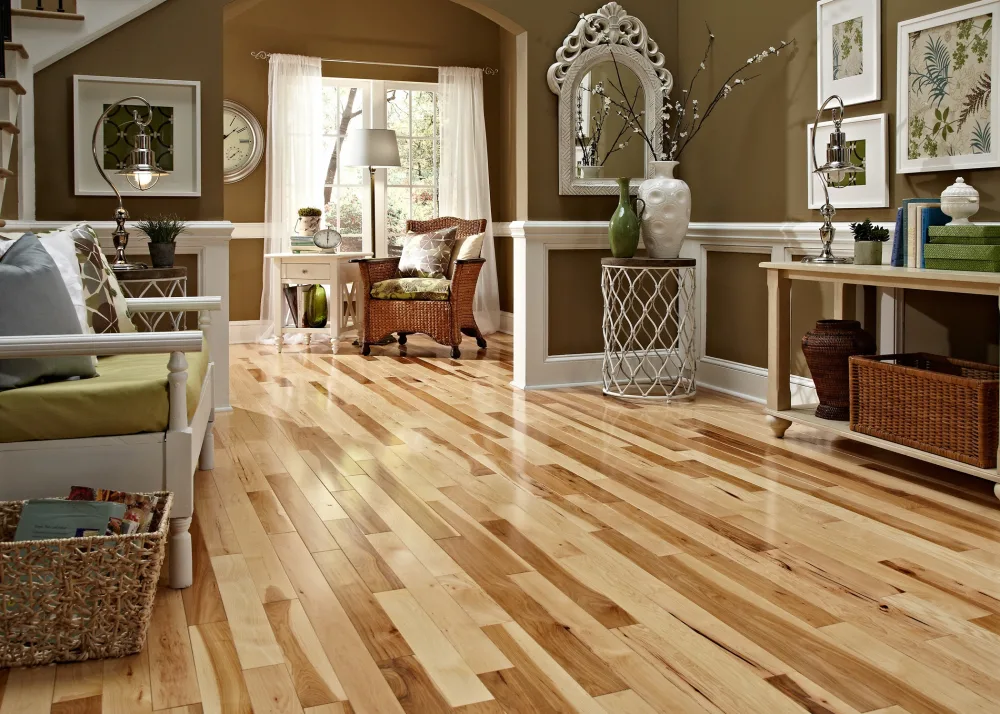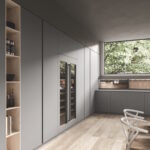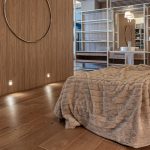- August 12, 2024
Hardwood flooring costs homeowners an average of $1,200–$4.200 for a 150-square-foot room. See which factors will impact your total cost.
Hardwood flooring remains a popular choice for homeowners due to its timeless beauty and durability. In 2024, understanding the cost of installing hardwood floors involves considering various factors, from the type of wood to installation methods and regional variations. This article provides a comprehensive breakdown of hardwood flooring costs to help you make informed decisions.
Key Takeaways
- Solid hardwood costs between $5 and $28 per square foot, while engineered hardwood ranges from $4.50 to $16 per square foot.
- Installation costs vary significantly, averaging $3 to $10 per square foot.
- Wood species and regional variations play a crucial role in determining the final cost.
- Maintenance and refinishing costs add to the long-term expense of hardwood flooring.
Major Factors Affecting Hardwood Flooring Cost
Apart from the raw material cost, plenty of other factors will affect the final cost – labor, wood type, area size, additional services, etc. In this section, we’ll cover any other major factor that may affect your total cost.
Cost by Area Size
How do you decide how many square feet of hardwood to buy? Right! The calculation is based on the area size you want to install the hardwood. This is the first and most important aspect, and you must take this into consideration. Here’s a table that will break the cost down for you.
Area Size | Cost Range | Average Cost |
500 sq ft | $3,500 to $12,500 | $8,000 |
1,000 sq ft | $7,000 to $25,000 | $16,000 |
1,500 sq ft | $10,500 to $37,500 | $24,000 |
2,000 sq ft | $14,000 to $50,000 | $32,000 |
2.500 sq ft | $17,500 to $62,500 | $40,000 |
3,000 sq ft | $21,000 to $75,000 | $48,000 |
Cost by Hardwood Type
The Hardwood flooring type is another important cost factor. The two most popular varieties of hardwood flooring are engineered hardwood and solid hardwood. Although solid hardwood flooring is more expensive, it is more long-lasting and durable due to its solid wood core. Engineered hardwood is made of layers of wood and plywood to reduce costs and increase longevity. In addition to cost per square foot, some key differences exist between different hardwood flooring options, which we break down below.
- Solid Hardwood: Solid hardwood consists of planks milled from a single piece of timber, offering a natural look and feel. It is typically more expensive than other types due to its durability and ability to be refinished multiple times.
- Engineered Hardwood: Engineered hardwood features an exterior of real wood attached to a plywood base. This type is less vulnerable to warping from humidity changes and is often more affordable than solid wood.
- Parquet Flooring: Parquet flooring involves smaller pieces of wood arranged in decorative patterns. It is the most expensive type due to the intricate design and labor involved in its installation.
- Prefabricated Parquet Tiles: Prefabricated parquet tiles offer a budget-friendly alternative to traditional parquet flooring. These tiles mimic the look of parquet but are easier and cheaper to install.
- Prefinished hardwood: Prefinished hardwood flooring offers convenience without compromising style. It features a protective finish and arrives ready for installation, eliminating the need for on-site finishing. This also helps you save on labor costs associated with refinishing.
Types of Hardwood | Cost Range | Average Cost |
Solid Hardwood | $5 to $28 per sq ft | $10.25 per sq ft |
Engineered Hardwood | $4.50 to $16 per sq ft | $16.50 per sq ft |
Parquet Flooring | $13 to $40 per sq ft | $9 per sq ft |
Prefinished hardwood | $6 to $12 per sq ft | $11 per sq ft |
Prefabricated Tiles | $10 – $16 per sq ft | $32.50 per sq foot |
Cost by Wood Species
The species of wood significantly impacts the cost. Harder and more exotic woods tend to be more expensive. Here are some common options:
- Maple: Maple is characterized by its light color, minimal grain, and smooth texture, making it a favorite for both residential settings and sports flooring. Its high density and hardness ensure significant resistance to wear.
- Cherry: Cherry wood offers a rich, reddish-brown color that darkens with age and a smooth grain, making it a sought-after choice for upscale and traditional homes. Although it has moderate hardness, it is more susceptible to denting compared to oak and maple.
- Red Oak: Red oak is known for its prominent grain pattern and reddish hue, offering high durability and excellent resistance to wear. It is widely used in both residential and commercial flooring due to its abundance in North America.
- White Oak: White oak features a more subtle grain and a color range from brown to grayish hues, providing a harder and more durable option than red oak. It is preferred for its versatility in traditional and modern interior designs.
- Brazilian Cherry (Jatoba): Brazilian Cherry is known for its rich reddish-brown color and interlocking grain, offering extreme hardness and durability. It is often used in high-end flooring applications.
Wood Type | Cost Range | Average Cost |
Red Oak | $8 – $15 per sq ft | $11.50 |
White Oak | $10 – $16 per sq ft | $13.00 |
Maple | $9 – $14 per sq ft | $11.50 |
Cherry | $12 – $22 per sq ft | $17.00 |
Brazilian Cherry | $7 – $13 per sq ft | $10.00 |
Labor
Labor is the final major aspect that affects your total cost. Labor costs vary depending on the complexity of the installation and the installer’s experience. Complicated installations, like flooring on stairs, will make the process more labor-intensive, which will definitely increase the price.
In addition, some installers may charge extra for other services required for prep or cleanup. Some installers charge a flat rate, while others charge by the hour.
Grade and Cut of Wood
The grade (quality) and cut (how the wood is sawn) influence both the appearance and cost. Clear-grade wood is more expensive due to its uniform appearance, while lower grades with more natural imperfections are cheaper.
Additional Cost Factors for Hardwood Flooring
Apart from these major factors, there are a handful of additional factors that will affect the final price you pay:
- Subfloor Repair: If the existing subfloor requires repairs or leveling before installation, it may cost between $1 and $5 per square foot.
- Underlayment: For certain hardwoods, an underlayment might be necessary for insulation or soundproofing. This typically costs between $0.50 and $2 per square foot.
- Finish Options: The choice between pre-finished and unfinished wood, as well as the type of finish (e.g., matte or glossy), can add between $2 and $7 per square foot.
- Trim and Molding: Costs for baseboards, transition strips, and quarter-round molding generally range from $1 to $5 per linear foot.
- Custom Patterns: Unique patterns or inlays can add between $5 and $15 per square foot to the cost.
- Old Flooring Removal: Removing and disposing of existing flooring materials typically costs between $1 and $4 per square foot.
- Moisture Barriers: In moisture-prone areas, installing a moisture barrier can add between $0.50 and $1.50 per square foot.
- Maintenance Products: Initial costs for cleaning and maintenance products are typically between $50 and $200.
Cost Comparison: Hardwood vs. Other Flooring Types
Hardwood flooring is considered to be the best flooring option. However, it’s not the only one out there. There are a number of other floors that you can choose from. To help you make a proper decision, we’ve created a table that compares the prices for each type of flooring option we have.
Flooring Type | Cost Range | Average Cost |
Hardwood | $7 – $22 per sq ft | $11.50 |
Laminate | $1 – $5 per sq ft | $2.50 |
Carpet | $2 – $10 per sq ft | $6.00 |
Vinyl | $1 – $7 per sq ft | $4.00 |
Signs You Need a New Hardwood Floor
You might want to upgrade your hardwood floors scheduled, however, there are signs that directly tell you that your hardwood floors need to be replaced.
- Severe Wear and Tear: Persistent, deep scratches or gouges that are difficult to sand out.
- Water Damage: Boards that have warped, cupped, or swollen due to water damage
- Structural Issues: Boards that are loose, squeaky, or move when walked on.
- Severe Cracking: Extensive cracking or splitting that compromises the integrity of the flooring.
- Inconsistent Color: Significant changes in color that cannot be corrected with refinishing.
- Termite damage: Small holes or sawdust on your hardwood floors that were caused by termites.
If you notice one or more of these signs on your floor, it might be best to replace your hardwood.
You might also ask – maybe a refinish is better for some of these signs…
Keep Reading Our Articles:
- Laminate Floors | Pros & Cons
- Hardwood Floors | Pros &. Cons
- Hardwood Flooring vs. Vinyl
- Laminate vs. Solid Hardwood Flooring
When to Replace vs. Refinish?
Refinishing hardwood flooring is often a more cost-effective alternative to replacing the entire floor. It’s ideal for addressing minor issues like surface scratches, color fading, and dings. Refinishing works well when the flooring is generally in good condition but needs a touch-up. It’s a suitable choice if there are no major problems such as mold, mildew, or rotting boards, and if the subfloors are still in excellent shape. Additionally, refinishing allows you to update the appearance with a new stain or a simple buffing.
On the other hand, if you encounter significant structural damage—such as deep gouges, gaps, warping, or cracks—or if the subfloors have deteriorated, replacement is recommended. Replacing the flooring is also necessary if the boards are 10 to 12 years old or older and have been refinished multiple times, as they may have worn out. If you are looking to change the style or type of your flooring or if the current boards cannot achieve your desired look, opting for a replacement is the best choice.
Pros & Cons of Hardwood Flooring
Here are the pros:
- Durability: Hardwood floors are built to last and can endure heavy foot traffic for decades with proper care.
- Aesthetic Appeal: They provide a timeless, elegant look and come in various styles and finishes to suit different design preferences.
- Increased Home Value: Installing hardwood floors can enhance your home’s resale value, making it more attractive to potential buyers.
- Easy Maintenance: They are simple to clean and maintain, typically requiring just regular sweeping and occasional mopping.
- Refinishing Potential: Hardwood floors can be refinished to restore their appearance or update their look, extending their lifespan and versatility.
None of us is perfect:
- Cost: Hardwood floors are often more expensive than other flooring options, including both material and installation costs.
- Moisture Sensitivity: They can be damaged by spills, leaks, and high humidity, leading to warping or swelling.
- Scratching and Denting: Hardwood can be prone to scratches and dents from heavy use or sharp objects.
- Noise: They can be noisy underfoot, especially in high-traffic areas or with hard-soled shoes.
- Temperature Sensitivity: Hardwood floors may expand or contract with changes in temperature and humidity, potentially causing gaps or warping.
Questions to Ask Your Hardwood Flooring Contractor
There are a lot of floor installation companies or agencies that can help you find the best contractor. And it’s important to be prepared to make the right choice. Here are some questions to ask your contractor before hiring.
- What is your experience with hardwood flooring installations?
- Can you provide references or examples of previous work?
- What types of hardwood flooring do you recommend for my project?
- What is the estimated cost for the entire project?
- Are there any additional costs I should be aware of?
- What is the expected timeline for the project?
- What type of warranty do you offer on your work?
- How do you handle issues or problems that arise during the installation?
- What is the process for acclimating the hardwood flooring before installation?
- Do you have insurance and the necessary licenses?
Also Read: Hardwood Floors vs. Carpet: Which is Right for You?
Hardwood Floor Care Tips for You
Hardwood floors have a long life span; however, to keep your floor’s look fresh and, of course, longevity, you should take proper care of it. Here are some care tips for you
- Clean Regularly: Dust and dirt can act like sandpaper on your hardwood floors, leading to scratches over time. Use a soft-bristled broom or a vacuum with a hardwood floor setting to remove debris. For deeper cleaning, use a damp (not wet) mop with a cleaner specifically designed for hardwood floors.
- Protect Against Scratches: Place felt pads or furniture coasters under the legs of chairs, tables, and other furniture to prevent scratches. When moving furniture, lift it rather than dragging it to avoid damaging the surface.
- Control Humidity: Wood floors expand and contract with changes in humidity. Use a humidifier during dry months and a dehumidifier in overly humid conditions to maintain a stable environment. Ideally, keep indoor humidity levels between 35-55%.
- Avoid Excessive Water: Too much water can damage hardwood floors. Wipe up spills promptly and avoid using excessive water when cleaning. If a mop is used, ensure it’s only slightly damp.
- Use Area Rugs: Place area rugs or mats in high-traffic areas and near entryways to catch dirt and moisture. Ensure these rugs have non-slip backing to prevent them from moving around and potentially causing accidents.
- Protect from Sunlight: Direct sunlight can cause hardwood floors to fade over time. Use blinds or curtains to minimize UV exposure, and consider using area rugs to protect parts of the floor that are most exposed to sunlight.
Our Recommendation
Professional hardwood floor installation will improve the appearance of your home and guarantee gorgeous, long-lasting flooring. To save money, you can try a do-it-yourself installation, but hiring a pro floor installer is what we suggest. Professional installers can guarantee the longevity of your installation because they are more knowledgeable about flooring types and installation methods. Additionally, they guarantee their work, so you can be sure that poor workmanship will not cause your warranty to lapse.
Ready to get started with your home renovation? Contact us, and our professionals will love to help you with your choice and price estimate.
Check out Elephant Floor’s biggest project in Silicon Valley.


